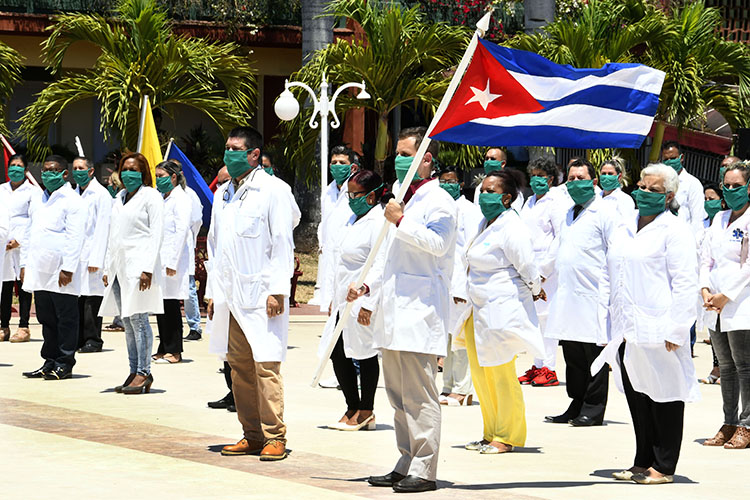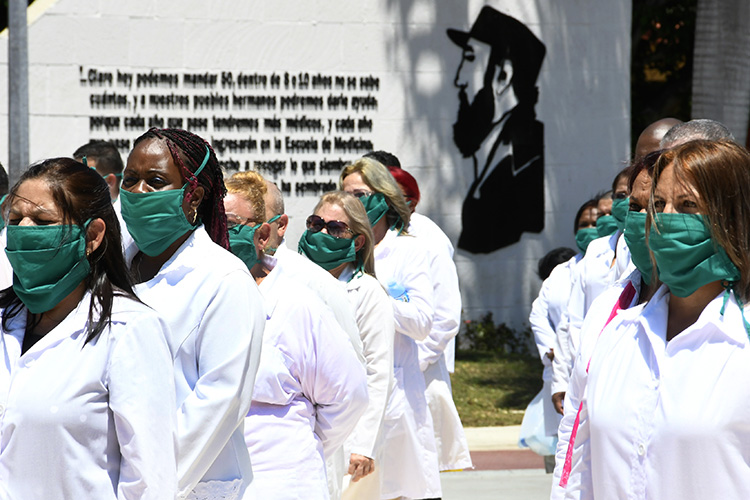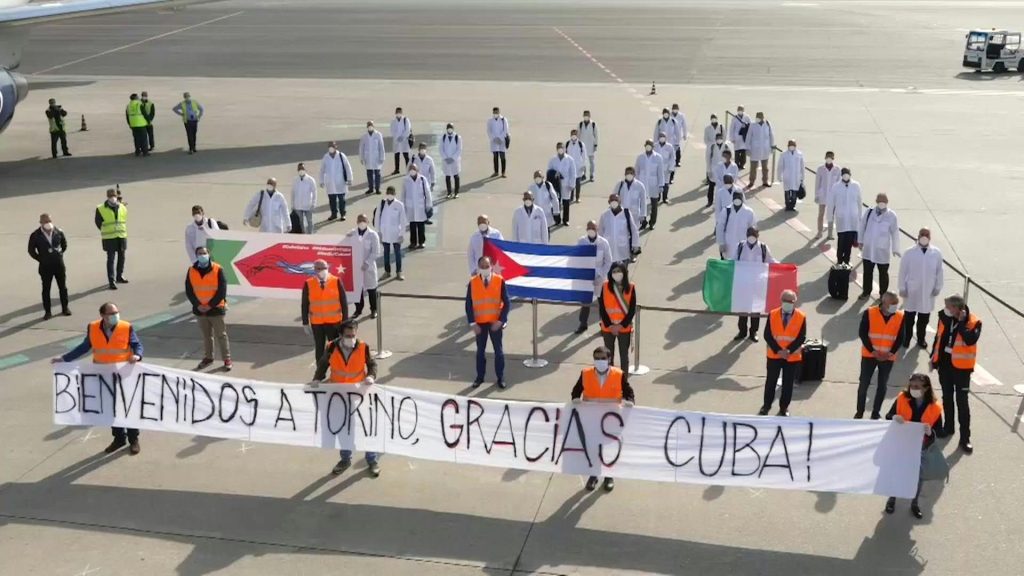Cuba exports doctors and is an example in the fight against the pandemic
Without having registered new deaths for two weeks, this Caribbean island sets a worldwide example by sending brigades of health professionals to 37 countries
Publicado 10/08/2020 - Atualizado 24/08/2020

July 26th is not an ordinary day in Cuba: the National Day of Cuban Rebellion is celebrated, commemorating the storming of the Moncada Barracks that occurred in 1953. Despite having failed, the action led by Fidel Castro and other 131 comrades revived the rebellious spirit of the Cuban people and it is considered the starting point of the Cuban Revolution.
This year, on the same day, the island also celebrated two weeks without deaths caused by the coronavirus. The death toll remains at 87 since the beginning of July, and despite having 192 infected health workers, none have died since the pandemic began.
Door to door, people first
Much of this success in the fight against the new virus was due to a meticulous health surveillance strategy. Medicine students and health technicians have traveled the country door to door to find suspicious cases. When the result of a test is positive, people with whom the infected persons had recently come into contact with are identified and taken to isolation centers during 14 days, free of charge, where they are also tested.
Many asymptomatic people who ended up testing positive were already isolated because they had been in contact with positives cases, and that slowed the spread of the virus. Social confinement measures were decreed at the beginning of the pandemic, and they were accompanied by the guarantee that 60% of wages for the entire working class would be maintained. The closing of schools, kindergartens, and the suspension of public transport were also decreed, in addition to the mandatory use of masks.
To escape the economic blockade imposed by the United States, Cuba must take advantage of its resources as Mayra Riverón Garrote, a family doctor who is acting in the frontlines of the battle against the pandemic in the country, explains: “We have built Cuban ventilators and we introduced some medicines produced nationally in our action protocols, like Biomodulina and Interferon [an antiviral very studied in Cuba, which it have been used in China and others countries to reduce immediate COVID-19 impacts], the Cuban meningitis vaccine [that increase the immunological response], and the homeopathic medicine PrevengHovir, which also contributes in this regard,” says the doctor.
“The Cuban strategy used to confront the Covid-19 pandemic is based on 60 years of experience in combating pandemics on and off the island. The Cuban healthcare model is free, universal, and of a social nature, with science at its core. This has allowed for the creation of dynamic health policies, with a focus on equity and social justice, which privilege health over any other interest”, says Riverón Garrote.
Margarita Araújo Suárez, president of Alamar Este Popular Council, in the municipality of La Habana del Este, where about 40 thousand inhabitants live, spoke with the Movement of People Affected by Dams (MAB) about the situation in the country, and said: “We feel protected because the number one priority is the people. Every Cuban man and woman has shown the whole world that we are a united country, that we are poor in ‘riches’ but we have the greatest of all riches, which is unity and love for our land and respect for the people. Despite being subjected to the cruelest blockades and sacrifices, we still go on, victorious”.
Historical example
Internationalist solidarity is part of the Cuban Revolution’s identity since forever, and sending medical cooperation is one of its pillars. The first brigade was sent to Chile in 1960, after the South American country suffered an earthquake, and until today, Cuban health professionals continue working in several territories.

In 2005, Fidel Castro created the “Henry Reeve” International Contingent of Doctors Specialized in Disaster Situations and Serious Epidemics, which since then has been in operation in countries like Angola, Haiti, Chile, Pakistan, Guatemala, Bolivia, Mexico, China and Peru, among many others.
The heroic performance of the Cuban contingent in caring for the victims of the Ebola pandemic in Africa between 2014 and 2015 resulted in the reception The Doctor Lee Jong-Wook Prize for Public Health in 2017, given by World Health Organization (WHO). During the ceremony, the organization stated: “The Henry Reeve Brigade has spread a message of hope in the whole world. The 7400 volunteer health professionals that integrate the institution treated more than 3.5 million people in 21 countries, facing the worst disasters and epidemics in the last decade”.
With the new virus pandemic, it wasn’t any different. According to data from the Health Ministry, Cuba sent 44 brigades, which account for more than 3,750 professionals, to 37 countries affected by the illness.
“It is one of the fundamental actions our country has taken, and shows that despite being a country that has been abused over the years, we have the will to continue and save our lives, our main task both inside and outside of our territory. Our socialism is based on love, and it always impregnated by the will to help others,” says Margarita Araújo Suárez.

Going against media manipulation and imperialist aggression, an international campaign, supported by the MAB, requests that the 2021 Nobel Peace Prize be awarded to the Cuban doctors who are working to combat the coronavirus.
In 2003, in a historical speech at the Buenos Aires School of Law, in Argentina, Fidel clearly expressed the ideas behind these actions: “Our country doesn’t possess nuclear weapons, or chemical weapons, or biological weapons. But we will be able to send the necessary doctors to the most inhospitable and remote places in the world. Doctors and not bombs.”
Legacy in Brazil
Cuban solidarity has also left a great mark on Brazil. The “Mais Médicos” program was created by the federal government during former president Dilma Rousseff’s (Partido dos Trabalhadores) first term. It had the aim of expanding healthcare in the country, and it received a great deal of support from Cuba.
The arrival of its doctors to the country brought medical assistance to communities that never before had access to the service, in addition to reaching the great urban peripheries. According to official data, between August of 2013 and November of 2018 —when Cuba withdrew its doctors after absurd accusations from president Jair Bolsonaro, who even said that program had the purpose to “create guerrilla cores”— more than 113 million patients were taken care of by the program in more than 3600 municipalities, giving permanent health coverage to 60 million Brazilians.
Translation: Ciro Casique Silva
Text revision: Selene Rivas

